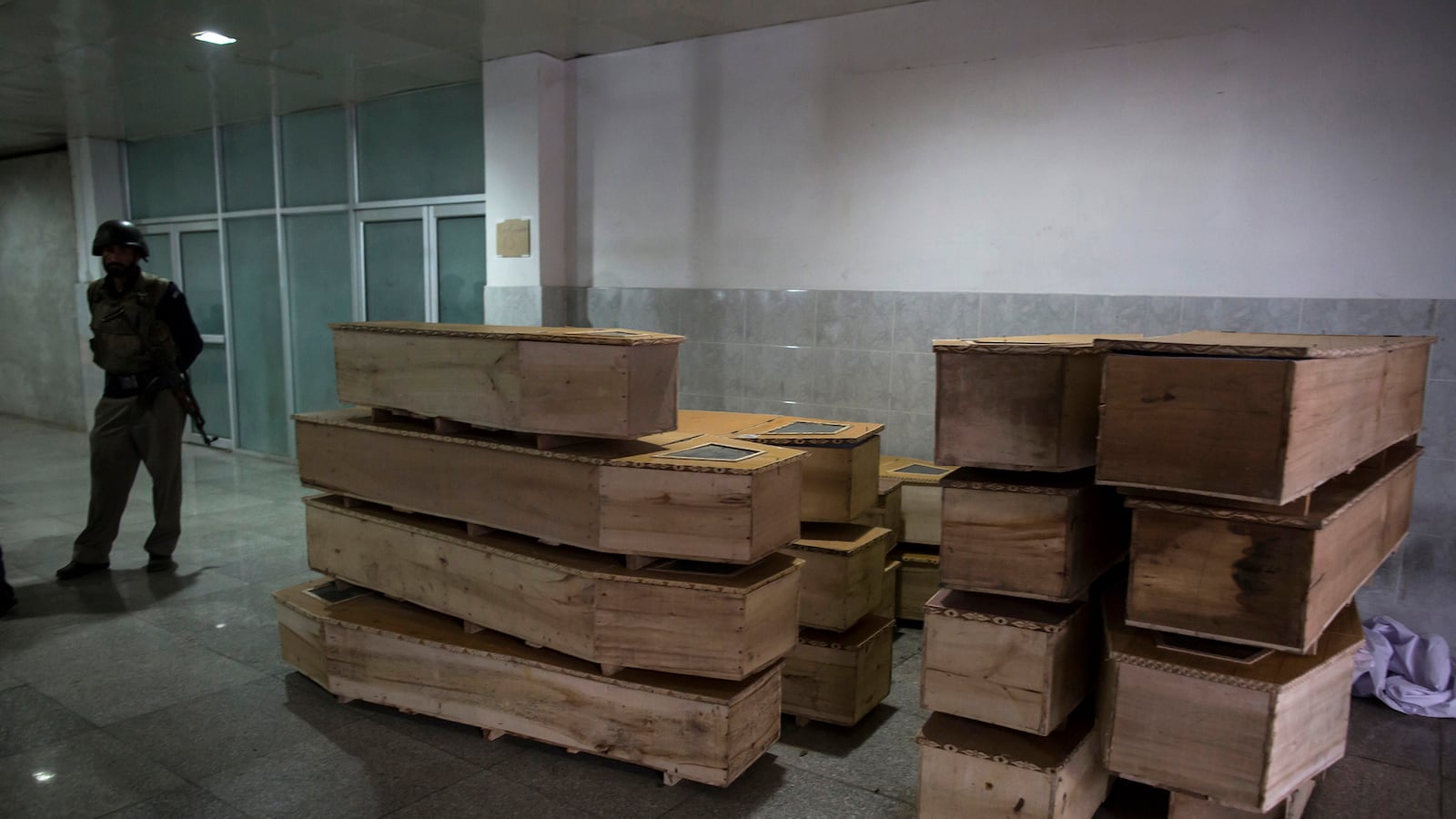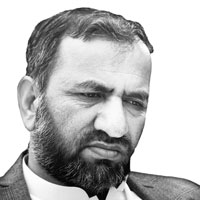The group behind the sickening slaughter of 132 schoolchildren and ten of their teachers in Peshawar, Pakistan, on Tuesday has set its sights on the United States in the past, and may do so again.
On May 1, 2010, a terrorist named Faisal Shahzad tried to set off a massive car bomb in New York City’s Times Square. It failed to explode, but U.S. officials knew they were lucky. Soon after the incident U.S. Attorney General Eric Holder said flatly that the Pakistani Taliban, also known a Tehrik-i-Taliban or TTP, were behind Shahzad’s plot, which could have killed and maimed hundreds of people. Holder said the TTP, allied to al Qaeda, had taken on “a new significance in our anti-terror fight.”
But that was more than four years ago. When time passes and things remain relatively quiet in the United States, Americans tend to think the problem has been solved.
In fact, the terror networks to which the TTP is linked have grown more complex and treacherous than ever, with some factions connecting not only to al Qaeda but to the so-called Islamic State (ISIS or ISIL) that now controls large swathes of Syria and Iraq. And while analysts think it is unlikely the TTP can mount an attack against American targets inside America again soon, the TTP said it butchered the children in Peshawar specifically because of the U.S.-backed campaign against it.
“TTP is a dangerous Islamic extremist terrorist group,” says a veteran U.S. counter-terror operative who followed the Times Square plot closely. Its leadership has long wanted to raise its profile. “They also were responsible for the Barcelona subway plot,” a plan disrupted by Spanish law enforcement in 2008. “My concern is that they took a shot at the U.S. homeland and it was a close call but they failed to do what they had hoped. I have no doubt they will eventually try again. They have a point to make—that they are a top-tier group and the measure of that is their ability to strike the American homeland.”
Exclusive telephone interviews with TTP fighters and spokesmen suggest just how savage and bitter the largely hidden war with the U.S. has become.
One young TTP jihadi, who calls himself Jamal Mujahid, told The Daily Beast that he left the Waziristan regions of Pakistan after the Pakistani military started its most recent military operations there. He moved to Afghanistan and then back to Pakistan via Quetta and is now in Karachi.
Jamal says he is saddened by the attack on the school, but when he learned that many of the children were the sons and daughters of Pakistani military personnel “that stopped my sadness,” he said.
“This is a result of the war the United States started against innocent Muslims and Taliban,” says Jamal. “Pakistan was dancing for the U.S. dollar and joined up with it without any dignity.” Jamal claims “U.S. dollars, U.S. drones and the pro-American policy [of the Pakistan government] should be blamed for the killing of these innocent kids.”
Like many other Pakistani Taliban, Jamal has his own horror stories to tell, which he believes can justify any bloody retribution. He said a drone strike in the Datta Khel region of North Waziristan, a favorite al Qaeda hideout, killed three children directly related to him in September 2012. “Two of the kids were age seven and age 11,” he said, and they were so badly blown apart that the family had to search for hours to find pieces of their bodies. “Can someone aged seven or 11 become a member of al Qaeda and the Taliban?” Jamal asked.
Jamal says that the governments in Pakistan and Afghanistan are drunk on U.S. dollars right now, but they should not forget that the United States eventually will leave them behind, “and the Taliban will not forget or forgive.”
Jihad Yar Wazir, a TTP commander, strikes the same note: “We are Pashtun and in Pashtun culture even if someone takes revenge after 100 years it still not too late.”
Yar Wazir suggested that the pressure put on by Washington and Islamabad shows the Pakistani Taliban their common interests with other jihadi groups. “The United States and Pakistan are the worst enemies of Islamic movements such as the Taliban, Islamic State, the Muslim Brotherhood, the Uzbeks and the Chechens,” he said.
“Every day the government of Pakistan and the Pakistani intelligence agencies are taking TTP prisoners out of their cages and leaving their dead bodies dumped in the open,” says Yar Wazir. Only a few days ago, the corpses of six men known to have been government prisoners were found along the banks of the Nowshera River near Peshawar.
Journalist and Taliban expert and journalist Inauatullah Kakar says “after the recent Pakistan army operation and, a few week back, the killing of the remaining al Qaeda elements in the tribal areas of the TTP, al Qaeda and the TTP were desperately looking for such a massive attack.”
“They got their chance and they inflicted great pain in the eyes of the world,” said Kakar. He and other Taliban sources claim that in Karachi as many as 50 to 60 Taliban are given summary executions each month. “That is what made the TTP react with such brutality.”
Kakar warns that the Pakistani military’s “confusion of good and bad Taliban” is making things worse. The Pakistani military helped to create the Afghan Taliban in the 1990s and has had close ties to it and to splinter groups like the Haqqani Group ever since, even though it is out to crush the Pakistani Taliban who are allied to them. “Pakistan has to change the narrative about militancy,” said Kakar .
There is now “a clear message from the TTP that it will be more ruthless,” says Kakar, and that it will work in alliance with other groups to achieve its goals. Kakar says he believes most of the Peshawar attackers were not TTP Taliban, in fact, but Uzbeks carrying out the TTP’s plan.
“Non-Pakistani militants are very strong inside Pakistan,” says Kakar. Uzbeks were responsible for a recent attack on Karachi airport, he said, and “it looks like of the attack in Peshawar is same.”
A former Afghan Taliban intelligence officer says he does not think at the moment the TTP are in position to attack in the West or in the United States. They certainly can hit U.S. installations nearby in Pakistan and Afghanistan, but the intelligence officer says such an attack would probably diminish the overall sympathy for the Afghan Taliban in Pakistan, just as the massacre on Tuesday has done.
“The Afghan Taliban are widely considered as freedom fighters in Pakistan and such attacks would hurt them,” says Kakar. “It was good that the Afghan Taliban denounced the attack.” But all these groups are reaching a point where vengeance takes priority over politics or, much less, public relations.
TTP commander Jihad Yar Wazir says he doesn’t care if the U.S. or the Pakistani army is angry after the Peshawar atrocity: “Were the United States and Pakistan so kind to the Taliban after 9/11?”
“There is already a full scale war against the TTP in Waziristan and the only thing Pakistan and the U.S. have not used against us is chemical weapons,” said Yar Wazir. “They won’t finish our ideology and strength in Pakistan by bombing, or with U.S. drones, or even if they use chemical weapons,” he said.
Brave talk to justify atrocious acts.
Said Akbar Aghah, a former Afghan Taliban commander, says that the longer the war goes on along both sides of the Afghanistan-Pakistan border, the more vicious it becomes. “The killing of innocent children is not justifiable at all,” he says, “but bear in mind a large number of innocents were killed by U.S. drones and the Pakistan army operating in tribal areas.”
Given such anger and such rationales, it can only be a matter of time until the wheel turns again, and Pashtun vengeance focuses not only on the forces that America supports, but on America itself.







